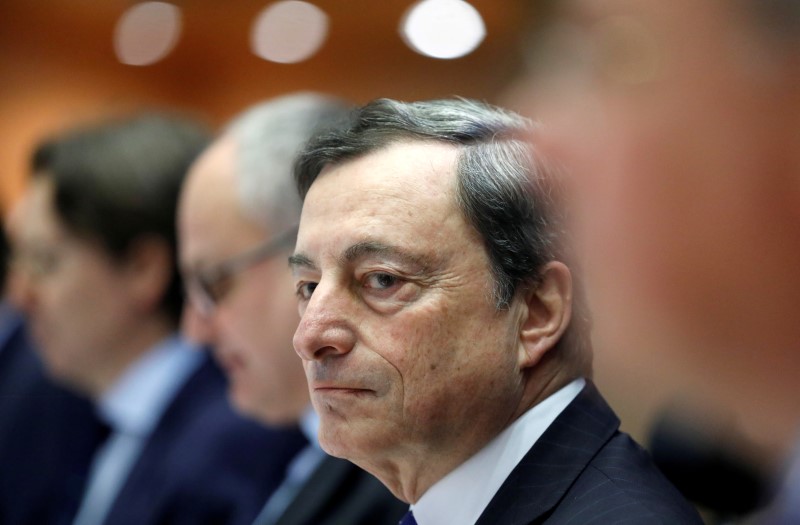By Balazs Koranyi
FRANKFURT (Reuters) - The spotlight shines on Mario Draghi once again.
The European Central Bank president has to reconcile an economic dichotomy of robust growth with weak inflation, a dilemma exacerbated by a seemingly unstoppable rise in the euro.
The time for thinking is running out, however. The ECB's massive stimulus scheme is due to expire by year-end so Draghi will have to start charting a new course when policymakers meet on Sept 7.
The problem is that the ECB is undershooting its near 2 percent inflation target for the fifth year running and will continue to miss into the next decade, failing on its primary mandate and potentially jeopardizing its own credibility despite unprecedented stimulus.
Economic growth, now into its 17th straight quarter, is even complicating the problem. The euro naturally firms as the economy roars ahead but that makes imports cheaper and holds back inflation even more.
Indeed, the currency is up by 13 percent this year against the dollar, a reflection of the euro zone's strength, policy uncertainty in the United States and expectations that one way or another, the ECB will have to tighten policy.
That leaves Draghi with a tricky job. He must acknowledge that work is underway on the future of stimulus but he needs to keep details to the minimum to buy a bit more time and temper edgy markets.
With few specific decision coming out of the meeting, it will be a communication tightrope with each word carrying extra weight.
"We think the key reason for staying put on 7 September is the sharp -- more than 5 percent -- rise in the euro since late June, a move that the ECB will not want to turbo-charge through additional hawkish rhetoric," UBS economist Reinhard Cluse said.
Indeed, markets see no policy change from the ECB in September and expect a decision only in October with asset buys cut by a third from next year, a Reuters poll of analysts showed.
STILL EFFECTIVE?
The big headache is that inflation is not behaving like it used to. Even as labor markets tighten, wage growth is not accelerating and prices fail to rise, indicating that models used by central banks may be outdated.
The shift could signal a change in the nature of inflation with supply, demand and labor becoming more global, implying that central banks' ability to control their own inflation has been reduced.
For Draghi, Europe's rapid ageing, hidden job market slack and more flexible labor markets may also be a drag.
Conservative policymakers argue that the ECB has done all that it could and should now step back, keeping policy easy but not running on all cylinders since that should be reserved for emergencies.
Doves fret that stepping back now could risk undoing years of work, damaging the ECB's hard-earned credibility.
Draghi will need to find middle ground for now.
Announcing new staff forecasts, he will likely upgrade the ECB's growth outlook and reduce inflation projections but only slightly.
He is also expected to announce that the ECB's technical committees have been tasked with mapping policy options, a signal that a decision is imminent.
Having already expressed concern about the rise of the euro in July, policymakers may also repeat their warning about the currency moving too quick.
But no other change is expected with Draghi also seen maintaining the ECB's guidance for even more asset buys if necessary.
"We expect the guidance will be maintained again because the ECB will want to avoid sending any message that could be prone to over-interpretation," Nomura said. "Very little has changed in the underlying euro area fundamental picture."
So Draghi will merely set up the market for a decision in October, also leaving the door open for a move in December.
Some argue that the real elephant in the room is Italy. Its GDP has yet to recover to pre-crisis levels, unemployment is high and its bank sector is weak. This has given a real platform for euro skeptics, a danger as the country heads towards an election next year.
Any big poll gains by anti-euro parties could increase market volatility and some argue that the ECB wants to hang onto its potent tools to soothe sentiment.

"It's also our long-held belief that it is in the ECB's interest to maintain a significant quantum of purchases throughout the Italian elections period, which potentially take place as late as May 2018," Bank of America Merrill Lynch (NYSE:BAC) said.